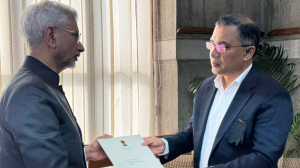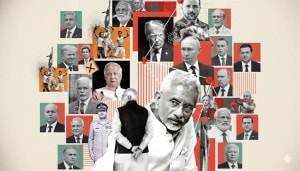PM as goalkeeper
Nowhere in the Constitution has goal-keeping been listed as part of prime ministerial duties, but that's all Atal Behari Vajpayee has done s...

Nowhere in the Constitution has goal-keeping been listed as part of prime ministerial duties, but that8217;s all Atal Behari Vajpayee has done since becoming Prime Minister in March. This is not really surprising given the fact that his party colleagues and the leaders of so-called friendly parties seem to be competing with one another to score one self-goal after another. Thursday saw him rush from the Upper House to the Lower House, trying hard to placate Opposition members incensed over an observation that the Union Minister for Urban Affairs and Employment, Ram Jethmalani, had reportedly made at a Press conference on the need to review the country8217;s reservation policy.
This, of course, is not the first time such contradictions have surfaced. On Thursday, Vajpayee also had to maintain that the 33 per cent reservation for women in Parliament and state legislatures, as specified in the women8217;s Bill, would not be diluted. Earlier, he had to contradict his party spokesperson, and insist that the women8217;s Billwould be presented in the present session. Then there was that notorious barrage of confusing words on the Ayodhya temple, with the hotheads within the Sangh Parivar insisting that the temple be built right away and aruging that the courts do not have any jurisdiction in matters of faith. Vajpayee valiantly stated on the floor of the House that his government would abide by the Supreme Court verdict on the issue. Some spokespersons for the party have proved especially awkward in handling issues that call for sensitivity and tact. Parliamentary affairs minister Madan Lal Khurana is a case in point. On more than one occasion he has blithely put his foot into his mouth without even realising that he had done so. The most recent instance of this is his handling of the Udham Singh Nagar issue, which his party8217;s coalition partner, the Akali Dal, has been particularly sensitive about. Vajpayee, again, had to step in to speak in a more diplomatic language on the issue. Khurana must be told that his impetuosity has tobe modulated if it is not to have grave consequences for his government8217;s image. It was he who had, on a visit to Jamp;K, indicated that India was prepared for a war with Pakistan. Vajpayee then had to publicly reprimand his colleagues for speaking in different voices on an issue as important as Indo-Pakistan relations and reiterate that India stood for peace in the sub-continent.
Some of this confusion arises out of the sheer inexperience of the BJP-led government. After all, it is only years of navigating the ship of state which imparts the valuable lesson that politics is the art of managing contradictions. Never is this more true than when the interests and susceptibilities of 13 variegated political parties come into play. Skillful coalition politics is all about making 13 heads speak as one. This requires coordination skills that the present government seems to be sadly lacking in. It is this failure that leads to situations when the single entity that is the government of India seems to think with 13different heads and speak in as many voices.
- 01
- 02
- 03
- 04
- 05































